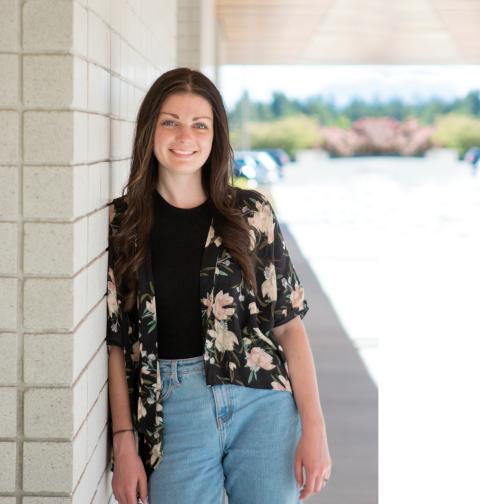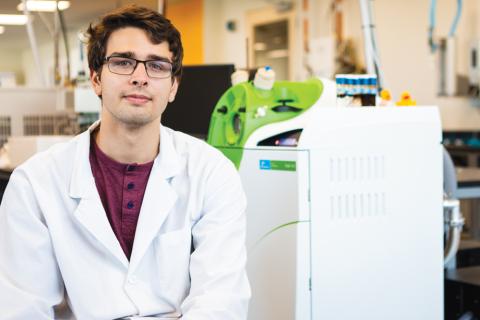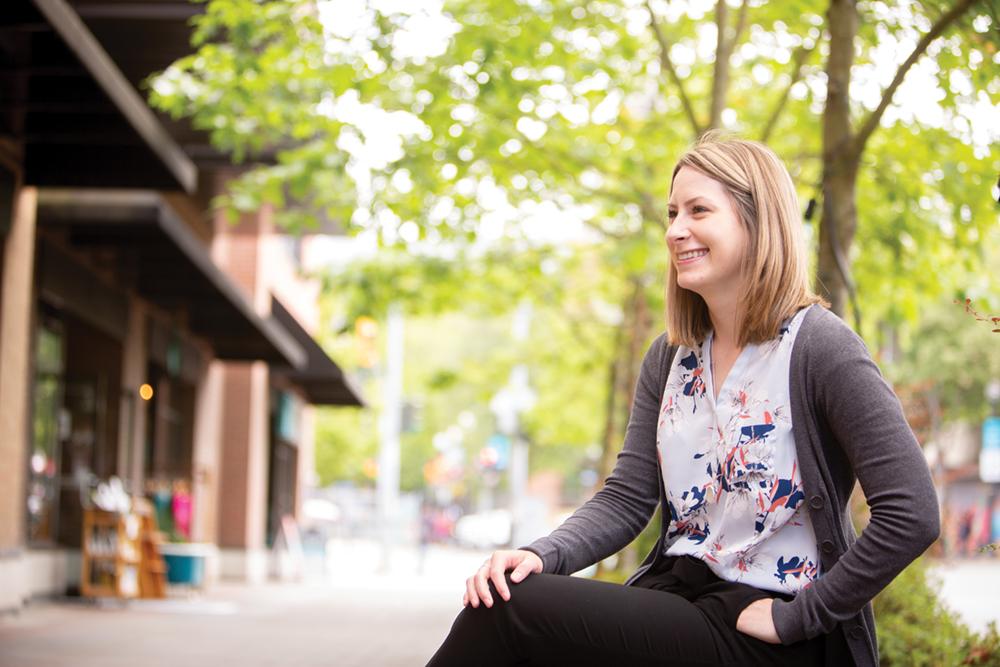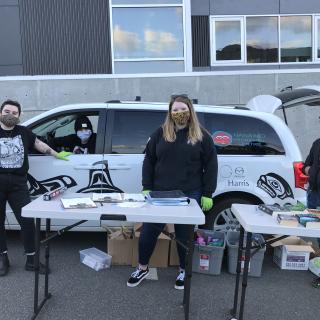The future is full of infinite possibilities for the more than 1,200 Vancouver Island University graduates who crossed the stage this year. Fuelled by their passions and equipped to excel in their fields thanks to hands-on learning opportunities and the support they received during their time at VIU, grads are ready to take on new challenges and opportunities in their chosen career paths. Three grads who had the opportunity to research real-world problems while at VIU share what lies ahead for them.
Lainy Nowak | Planning for a Better Future
by Jenn McGarrigle
There is no such thing as a typical day for Lainy Nowak.
The Vancouver Island University Master of Community Planning (MCP) alum, who started work as a City of Nanaimo Planning Assistant earlier this year, says each day brings new challenges and learning opportunities that keep her on her toes. From helping the public understand land use within the city, to supporting development permits and applications that represent growth and change in the community, Nowak is amazed by all the exciting things happening in Nanaimo and thrilled to be part of it.
“I feel grateful to be in a position that allows me to shape the community I live in,” says Nowak. “Not only am I at the start of an exciting career because the MCP program set me up for success, but I also find myself in a naturally stunning city in one of the most beautiful places in Canada. It can’t get much better than this.”
Growing up in Prince George, Nowak completed an undergraduate degree in political science and international studies and a public administration certificate at the University of Northern British Columbia. Like many undergrads, she wasn’t sure what she wanted to do after graduating, so she taught English in Japan for a year. When Nowak came back, she worked at the City of Prince George in a role that allowed her to see how different departments function within a municipality.
“The planning department really seemed to be where all the buzz and excitement was coming from; however I was faced with a ‘glass ceiling’ on how far I could advance within the city without further education, so I decided to apply for planning school,” she remembers. “To my surprise, I was accepted into planning programs across the country. I chose Nanaimo because you can’t beat being close to the mountains and the ocean.”
Nowak has never regretted her decision. She says the hands-on experiences she’s had access to at VIU have ultimately helped her get the job she’s in now. For example, she helped Dr. Pam Shaw, Director of the MCP program, start a peer-reviewed online academic journal called Future Plans. As editor of the journal, which accepts submissions from students, professional planners, consultants and researchers across Canada, Nowak created a website, engaged a panel of reviewers and put out calls for submissions.
For the past couple years, Nowak has conducted some exciting research of her own on a timely topic – how to help cities better prepare for natural disasters and climate change. Last year, she travelled to Christchurch, New Zealand, funded by a Queen Elizabeth Scholarship, to work with that city’s Civil Defence and Emergency Management department. In February 2011, a 6.2-magnitude earthquake struck 10 kilometres southeast of Christchurch, causing nearly 200 deaths and a massive amount of damage to structures. Nowak was there to discover what lessons city officials learned that could apply to other communities.
“We are seeing the effects of climate change worldwide,” she says. “The frequency of severe weather events continues to increase, and we know that it’s only a matter of time before the West Coast experiences a large earthquake. My research explores how planning and policy can help shape cities before an event happens in order to save lives, ensure faster recovery and improve the well-being of people who live in the community.”
Shaw says Nowak’s research project addresses a knowledge gap – both here and in New Zealand.
“Lainy is an amazing ambassador for our program – she exemplifies all of the practical, applied approaches we strive to achieve, while also maintaining her enthusiasm for solving problems and creating safe and welcoming places,” she adds.

Emma Gillis | Creating Conversations about the Opioid Epidemic
by Rae-Anne Guenther
Supporting the rights and well-being of children, youth and families is a passion for Child and Youth Care (CYC) alum Emma Gillis.
“What drew me to the CYC program at VIU is its focus on relational and experiential learning,” she says.
Gillis received that hands-on learning experience through the Centre for Community Outreach and Care (CCOC), a third-year practicum placement for students. The centre works with local Nanaimo stakeholders to identify community needs and engage in child- and family-focused activities.
Over the past two years, Gillis had the opportunity to research and analyze how children, youth and families within the community are impacted by the opioid epidemic. The focus of her practicum was coordinating a series of community- based dialogues. The other component of the project was to create a children’s group for those affected by the opioid poisoning epidemic.
“This project has had a tremendous impact on the community, bringing together a wide range of community members, service providers and young people impacted by the epidemic, honouring and valuing the lived and living experiences of community members,” says Gillis. “It was a great experience discovering the immense strength our community holds.”
VIU Professor Stephen Javorski says Gillis’s passion for her community and for the opioid crisis project led her to continue developing the project during her fourth year of study.
“Emma’s work embodies the intended purpose of the outreach centre – to provide meaningful learning opportunities for students while helping to provide support to community members,” he says. “It has been a pleasure working with Emma during her studies at VIU and I wish her the best as she starts the next chapter of her academic career.”
Throughout her time at VIU, Gillis’s passion for supporting children and families has only deepened. Her experiences through the program have helped broaden her understanding of the many inequities people in the community face on a daily basis.
“It has allowed me to not only recognize but truly value the internal strengths and resiliencies each of these families hold,” says Gillis. “The program has provided me the opportunity to gain a deeper sense of self, recognizing my own strengths, limitations and privileges and how they all relate to and interact with the work I intend to engage in.”
Gillis starts a Master of Arts in Child and Youth Care at the University of Victoria this fall, and hopes to continue engaging in community-based research that bridges the gap between people accessing services and those providing the services.

Joseph Monaghan | Saving Streams with Chemical Analysis
by Jenn McGarrigle
Joseph Monaghan plans to spend the next several years developing a measurement technique that will allow scientists to “take the lab to the water” to determine immediately on-site if rivers, lakes or oceans are contaminated with toxic chemicals and in need of remediation.
The Biology graduate is doing this work in VIU’s renowned Applied Environmental Research Laboratories (AERL), which conducts ground-breaking environmental and analytical chemistry research, as part of a Master of Science degree in the University of Victoria’s Department of Chemistry.
Monaghan got involved with the lab as a first-year student after he approached one of his chemistry professors, Dr. Christine Tong, and asked her how he could improve his lab skills.
“I was really nervous in the lab and didn’t feel like my practical skills were there,” he remembers. “She suggestedI go help out in the AERL and made the introductions.”
Dr. Erik Krogh, Co-Director of the AERL, discovered quickly that Monaghan is “ the kind of student who makes a strong impression in the classroom and in the research lab with his ability to work a problem on the fly.”
“He has keen problem solving skills, an insatiable academic curiosity and an intellectual generosity second to none,” he adds.
Monaghan certainly achieved his initial goal of improving his lab skills to excel in his classes – as a second-year student he won a President’s Scholarship for being the top science student at VIU – but the work had unexpected side effects. He ended up working in the AERL as a full-time Research Assistant with a Natural Science and Engineering Research Council of Canada undergraduate research award for three consecutive summers. He has also contributed to three peer-reviewed scientific papers during this time – an exceptionally rare achievement. The experience has even changed what he wants to do with his life.
Before entering university, his goal was to get into medical school and become a doctor – a goal his mother hoped meant he would have the funds one day to buy her a hot tub, he jokes. As he moved from helping out with routine measurements, to designing the research that will hopefully save streams and other waterways and the flora and fauna that depend on them, he realized that he wants to become an environmental scientist.
“There’s a reason to be an environmental scientist everywhere in the world right now, but if I want to stay around here, going to med school and becoming a doctor might still be my best option,” says Monaghan, who is born and raised in Nanaimo. “I don’t have a plan other than I’m hoping to finish master’s and then a doctorate degree while working at the AERL. I like solving problems – well, mostly the solving part, the struggling part is less fun – and I like precise answers.”
Krogh describes Monaghan as an excellent communicator who is very generous with his time, spending hours tutoring and mentoring others while remaining humble about his achievements. His friends like to joke about catching him making his “annual mistake” and call him a nerd – as a term of endearment – for his work helping others around exam time.
All the extra work added up to exceptional grades, which earned him a Governor General’s silver medal award for being VIU’s top undergraduate student for 2019. The award was presented at his convocation ceremony in June.
“I’m very honoured. Afterwards, I went around to thank my profs – if it wasn’t for them, I wouldn’t have been able to do it,” he says. “I’ve enjoyed and definitely abused the very open-door policy of my profs.”


